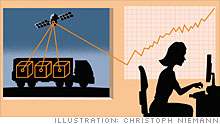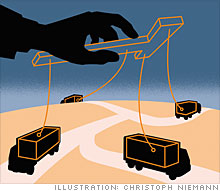GPS phones help monitor staff
Small business owners can shave payroll and logistics costs with new, low-cost tracking tools.


(Fortune Small Business) -- For years, Grant Opperman's tiny delivery company struggled to keep up with the giants of its industry.
FedEx (FDX, Fortune 500) and UPS (UPS, Fortune 500) deployed tracking technology that could pinpoint a package within minutes of its arrival at any given facility. Opperman's 90-employee firm -- D.W. Morgan, based in Pleasanton, Calif. -- was forced to rely on the memories of its 30 drivers, who were instructed to phone the boss whenever a shipment arrived. The drivers didn't always remember to call, and managers spent hours on the phone following up. When clients -- which included 20 Fortune 500 companies -- called about an undelivered package, Opperman couldn't tell them where it was.
That was okay for a niche company (D.W. Morgan delivers high-tech hardware) with $50 million in annual revenues. But Opperman dreamed of international expansion and knew he needed a better tracking system. He couldn't afford what the big guys had -- FedEx alone spends $1 billion each year on its tracking setup. So he bought the cheapest iPhone ($200) for each of his drivers, paid $300 for a developer's license from Apple (AAPL, Fortune 500) and asked one of his in-house tech specialists to build a custom application that used the phone's global positioning system (GPS) technology.
"I had to be creative to show my value," Opperman says.
Not so long ago, most of us associated GPS with expensive in-car guidance systems that gave driving instructions in patronizing voices. Today, the receiver technology, which can pinpoint your position anywhere on the planet based on data from six orbital satellites, is cheap, and small enough to fit in many phones. Most major carriers now sell GPS packages on cell phones starting at $10 per phone per month.
Global spending on GPS receivers and software is set to hit $13 billion by 2013, according to ABI Research in London, up from $2.5 billion today. Entrepreneurs like Opperman are getting creative with the technology -- using it to keep tabs on remote workers, to track down stolen machinery and even to plant crops.
"GPS is pervading every aspect of life and business," says Dominique Bonte, practice director at ABI. "You'll see many more applications in the future."
D.W. Morgan's clients can now track shipments online in real time. The custom application -- developed in six weeks -- displays the precise location of each truck on a Google (GOOG, Fortune 500) map. Drivers ask package recipients to sign their iPhone screens. The signatures are immediately uploaded to the company Web site.
"Even the big guys don't get it that fast," says Opperman proudly.
For a total investment of $21,000, including the salary of one IT worker for six weeks and $5,970 for 30 iPhones, Opperman estimates he will save $96,000 a year, based on the number of work hours he and his drivers spent filing, getting signature documentation and making manual data entries. Better yet, the system is allowing him to expand: Starting at the end of this year, D.W. Morgan will begin delivering in the Czech Republic and Thailand.
There's no need to build your own iPhone application, though. AT&T (T, Fortune 500), Verizon (VZ, Fortune 500) and Sprint (S, Fortune 500) sell GPS packages using software from Gearworks of Eagan, Minn., TeleNav of Sunnyvale, Calif. and Xora of Mountain View, Calif. The cheapest deals buy you basic driving directions. Those monthly prices don't include data plans, which typically range between $15 and $30 per month. Expect a onetime activation charge of $20 to $25 per phone to be tacked on.
More expensive packages, which run about $22 per phone per month, include features such as GPS time-carding, which allows employees to clock in and out using their cell phones. A tool called geo-fencing lets you draw a boundary on a map and sends text alerts if your employees cross it. Users of iPhones can download MotionX-GPS, a $2.99 application that will track routes and overlay the path on a Google map, tracing where they've gone and how long it took to reach their destination.
Getting started isn't always simple, as John Tartaglione discovered. Tartaglione owns JMS Partners, a residential construction firm based in Hopkinton, Mass. He installed Xora's GPS app on his four employees' cell phones so they could clock in remotely from job sites. But getting the software to work properly was a frustrating experience that took a couple of months, including many hours on the phone with Xora's tech support staff.
Tartaglione's employees hated being tracked. Some simply turned off their phones. Many viewed the entire system as a waste of resources. Carrie MacGillivray, a senior analyst at Framingham, Mass.-based research firm IDC, calls getting support from employees the greatest challenge in GPS tracking.
"They don't want Big Brother," she says.
Tartaglione has yet to demonstrate the system's worth to his employees. Still, remote time cards shaved off 15 minutes here and there from the time workers claimed they were at the job site. The result: a few thousand dollars in payroll costs saved. Now, when bidding new work, Tartaglione knows better how long it really takes to get a job done.
"This clearly helps me with profitability," says Tartaglione. "It's been invaluable."
GPS snooping can be legally risky, particularly if your monitoring extends beyond working hours -- even if you don't know it. Fire or reprimand an employee and she could claim that your knowledge of her off-hour activities -- such as a medical appointment or a union meeting -- was being used unfairly.
"When they're not working, turn it off," advises Jonathan Segal, an employment attorney with WolfBlock in Philadelphia.
On the other hand, precise time tracking can also work to the advantage of employees. When Gem Plumbing, Heating and Electric installed a GPS system to keep its 168 trucks on schedule, the Lincoln, R.I.-based firm offered bonuses to drivers who reached customers on time. The more efficient the technician, the bigger the bonus.
Gem's technicians now reach 95% of appointments on time, up from 50% before the GPS system was installed. The average monthly bonus per worker: $750.
"Employees need to know what's in it for them," says Gem president Anthony Gemma.
If GPS turns out to be integral to your business and you need more than phones can offer, you can upgrade to more specialized, sophisticated GPS hardware from established players such as Navtrak, based in Salisbury, Md.; NetworkFleet, out of San Diego; and Sunnyvale, Calif.-based Trimble. Operating costs for these systems can range from a few hundred dollars to several thousand dollars a month, depending on your requirements.
Trimble alone generates revenue of $1.3 billion a year selling GPS equipment such as "precision agriculture" systems that control and drive forklifts and tractors. Thanks to Trimble, Iowa corn farmer Dennis Smith can climb on his tractor, push a button and watch his fields get seeded and fertilized in perfectly straight rows. The payoff: Smith's crop yields and profits have both climbed 5% in the year since he adopted the system.
Better yet, Smith and his single employee can work longer hours with less fatigue.
"I will not farm without it anymore," says Smith, who invested about $65,000 in the system, including activation fees and money spent on base stations, receivers, navigation controllers and antennae. "You can literally sit and read the newspaper while the tractor tills the field." ![]()
-
The Cheesecake Factory created smaller portions to survive the downturn. Play
-
A breeder of award-winning marijuana seeds is following the money and heading to the U.S. More
-
Most small businesses die within five years, but Amish businesses have a survival rate north of 90%. More
-
The 10 most popular franchise brands over the past decade -- and their failure rates. More
-
These firms are the last left in America making iconic products now in their twilight. More











